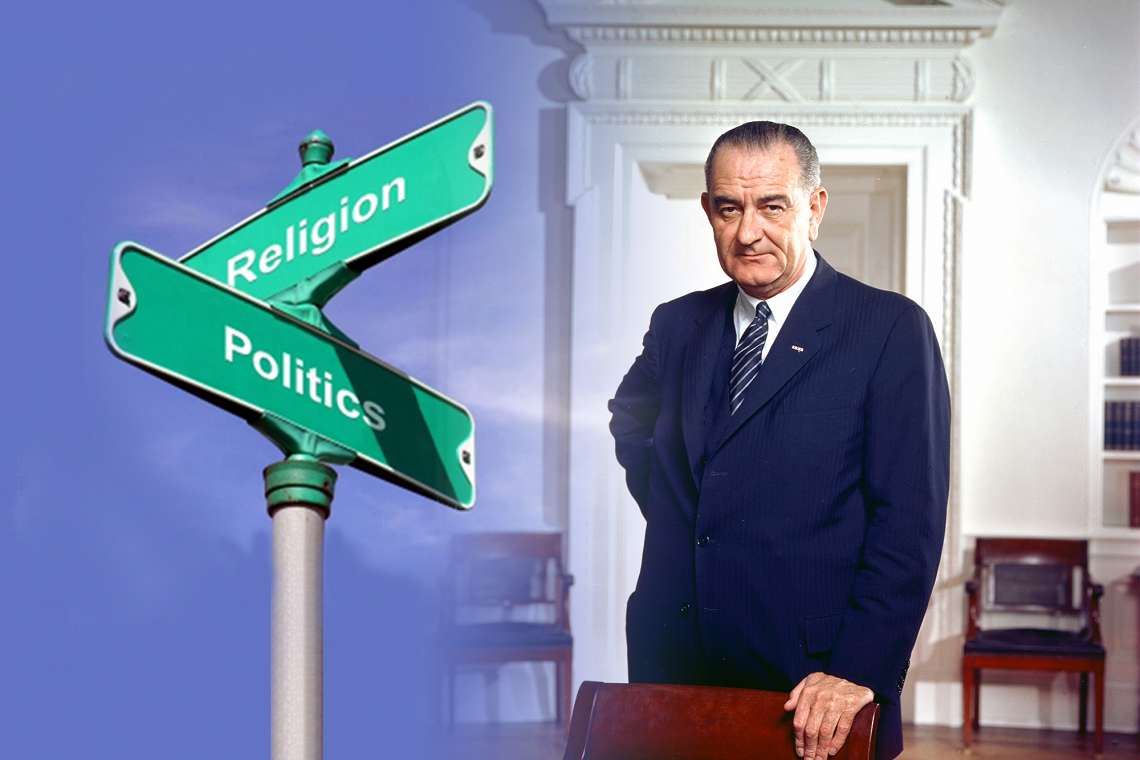The Johnson Amendment: Freeing America’s Pastors from IRS Intimidation Means Repealing It
Posted on October 22, 2014 in Religious Freedom by Nathan Cherry
 Most people have never heard of the Johnson Amendment. For that matter as soon as you say IRS code you will lose most of your audience. Nevertheless, this one amendment has had a significant impact on churches and, as a result, on society as a whole.
Most people have never heard of the Johnson Amendment. For that matter as soon as you say IRS code you will lose most of your audience. Nevertheless, this one amendment has had a significant impact on churches and, as a result, on society as a whole.
The Johnson Amendment was inserted into the IRS code in 1954 as a way to limit the speech of pastors and churches regarding elections, political campaigns, and social and political issues. Taking a cue from the fictitious “separation of church and state,” the Johnson Amendment seeks to control the speech of America’s pastors because of the influence they wield.
No doubt the effects of the Johnson Amendment are clear today. At one time America’s pastors took a leading role in education their congregations regarding political issues and candidates, now, most pulpits are silent.
Groups like Alliance Defending Freedom are leading the way in restoring freedom to America’s churches and pulpits. The “Pulpit Freedom Sunday” campaign has been a major tool in encouraging pastors to speak up and speak out on critical issues facing our society. And I am grateful for their efforts.
What is sad is the fact that since the Johnson Amendment was inserted into the IRS code not one church has ever lost its tax-exempt status as a result of “political speech.” Even with hundreds of pastors sending recorded sermons to the IRS each year as part of the “Pulpit Freedom Sunday” campaign to the IRS, there hasn’t even been a lawsuit or investigation.
One would think that if the IRS was serious about limiting “political speech” from churches that surely there would be some kind of action when a clear violation of IRS code has taken place. Nope, nothing. Then again that may be the intended effect of the Johnson Amendment all along. Intimidation by the government and IRS may be far more powerful than anything else. So rather than be challenged in a court of law where the Johnson Amendment would no doubt be declared unconstitutional and struck down, the IRS is simply ignoring the violations in favor of large scale intimidation.
Recently the Evangelical Council for Financial Accountability (ECFA) organized a study to determine whether the Johnson Amendment should be amended or repealed. Their findings were reported by ADF’s Speak Up Blog.
In general I am a huge fan of ECFA and ADF and the Speak Up blog and campaign. But, I must admit I was a little surprised by the ECFA findings and agreement by ADF. After the ECFA review of the Johnson Amendment they determined it should be amended with the following suggestions:
- Speech that would be no added cost or a very minimal cost to the organization (such as a sermon, not an expensive advertising campaign)
2. If the speech of the organization would cost more than that minimal amount, then the Johnson Amendment would only prohibit speech that clearly identifies candidates and directly calls for those candidates’ election or defeat.
ADF agreed with these findings and supported the conclusion by saying:
“This fix, if adopted, will relieve a great deal of pressure on churches and other non-profit organizations. It will get the IRS out of the business of censoring what a pastor says from the pulpit and will go a long way to bringing clarity to the IRS’ enforcement of the Johnson Amendment. ECFA’s proposal overrides the negative effects of the Johnson Amendment without even having to repeal it. It is a practical, realistic way to restore a fundamental right to churches and other non-profits that everyone, including Congress, can get behind.”
My problem with this conclusion is that it:
First, agrees to leave the Johnson Amendment in place. Without a full repeal you can be sure the IRS will continue its underhanded tactic of intimidation against churches for any speech it considers “political.”
But second, this conclusion admits that there is some speech that should be regulated by the IRS. From one side of their mouth politicians such as Nancy Pelosi and Harry Reid say that churches should not get involved in “political” matters. But from the other side of their mouth they encourage pastors to push their liberal agenda items like ObamaCare and abortion. This double standard is caused by the Johnson Amendment as it makes IRS regulation of speech a tool of whoever controls Congress.
But this “fix” further emphasizes that some speech simply does not belong in the pulpit. I know my friends at ADF don’t believe that. They fight each day to secure religious freedom for Americans and people across the world. But this “fix” tells the IRS that they get to determine exactly what constitutes “political” speech and regulate it. Today that might mean calling a candidate out for supporting abortion, tomorrow it means calling abortion sin.
The only real “fix” to the Johnson Amendment is to repeal it entirely. Until the IRS understands that they have absolutely no control over the speech of America’s pastors and pulpits, there will always be a problem.
While we might disagree on what pastors ought to say from the pulpit, we can certainly agree that pastors, not the IRS, should be the only ones deciding what they will say.
